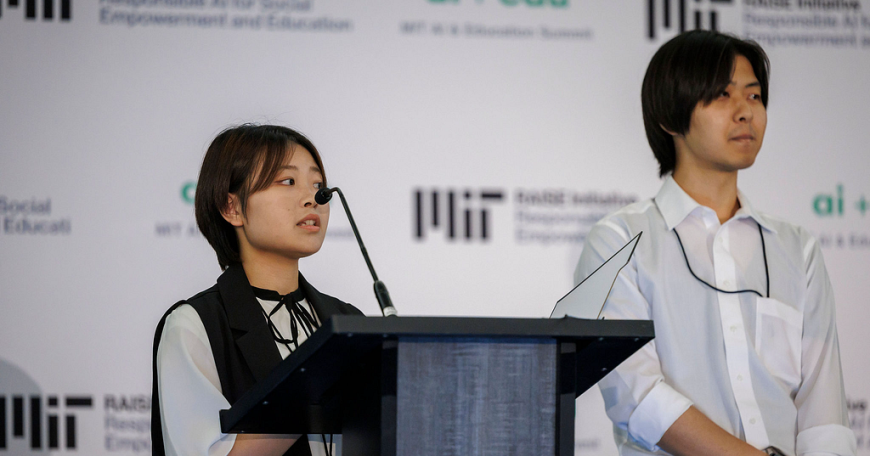
Global AI Hackathon provides outlet for MIT App Inventor enthusiasts to create social impacts
By Stephen Nelson
Imagine a world where people across the globe come together with a common goal: to build apps that might spur a positive social impact. That world is already here thanks to a free, virtual hackathon hosted by the MIT Responsible AI for Social Empowerment and Education (RAISE) initiative and MIT App Inventor, with help from the App Inventor Foundation.
The inaugural Global AI Hackathon drew nearly 1,000 participants from over 80 countries. The goal of the competition was to develop an AI app using MIT App Inventor that aligns with one of the competition’s two tracks and demonstrates creativity, social impact, and technical understanding of AI.
App creators had approximately five weeks after the contest was announced to create their apps along with a short video presentation about how their apps would help spur social impact. This year’s themes included climate and sustainability and health and wellness. While the contest was open to inventors of all ages, the median age of participants was 16 years old. The winners were announced at the MIT Day of AI celebration. The winning apps include:
- Signlingo, Youth Team Winner (USA): SignLingo, an innovative AI-powered app, achieves two-way translation between American Sign Language gestures and spoken languages. It bridges communication gaps for individuals with hearing and vision disabilities, fostering inclusivity within the community.
- VIPMOD, Youth Individual Winner (Ireland): VIPMOD (Vision Impaired Person’s Moving Object Detector) is a system for detecting moving objects that helps people who are vision impaired or have other access needs to live safer and more independent lives.
- Neo Talk, Adult Team Winner (Japan): Neo Talk helps people who have fewer opportunities to engage in face-to-face communication develop the ability to sense the feelings of others and learn to communicate in a way that builds deep relationships, through talking with AI characters.
- Doc Tongue, Adult Individual Winner (South Korea): For people who have difficulty seeing a doctor in person, this AI-powered app allows a person to check their health status through the characteristics of their tongue — such as color, abscesses, and surface texture — using only an image.
Winners were awarded free flight and hotel to showcase their project at the MIT AI & Education Summit in Cambridge this summer. During the Summit, they presented their app to more than 300 attendees from over 30 countries.
Haksung Kim, an associate professor at Dongnam Health University in Korea, created the Doc Tongue App. During his talk, Kim mentioned that Korea takes technology and education very seriously, with all students learning to code — most of them through the use of Scratch and App Inventor — and all nationally funded.
“Korea is the only country in the world where K-12 students have to learn to code,” Kim said, adding that “five million students in Korea are using Scratch and App Inventor currently.”
The NeoTalk app creators also took the stage to talk about their project. Tomoya Sato and Shitara Kaede, two students at the Kanagawa Institute of Technology in Japan, spoke about their app and the need to help other students with social anxieties.
“Neo can talk and express emotions, just like a human,” said Kaede.
Sato added, “Technology has reduced our opportunities to communicate with people in real life. Neo tries to mimic human emotions, acting sad or happy even when receiving news that contradicts these emotions.”
Several other apps received honorable mentions. Those apps and other demographic information are included in the Hackathon Impact Report. Going forward, the Hackathon will be held annually. Interested app creators can learn more about next year’s contest by following MIT RAISE, an initiative headquartered in the MIT Media Lab in collaboration with the MIT Schwarzman College of Computing and MIT Open Learning.
Global AI Hackathon provides outlet for MIT App Inventor enthusiasts to create social impacts was originally published in MIT Open Learning on Medium, where people are continuing the conversation by highlighting and responding to this story.

